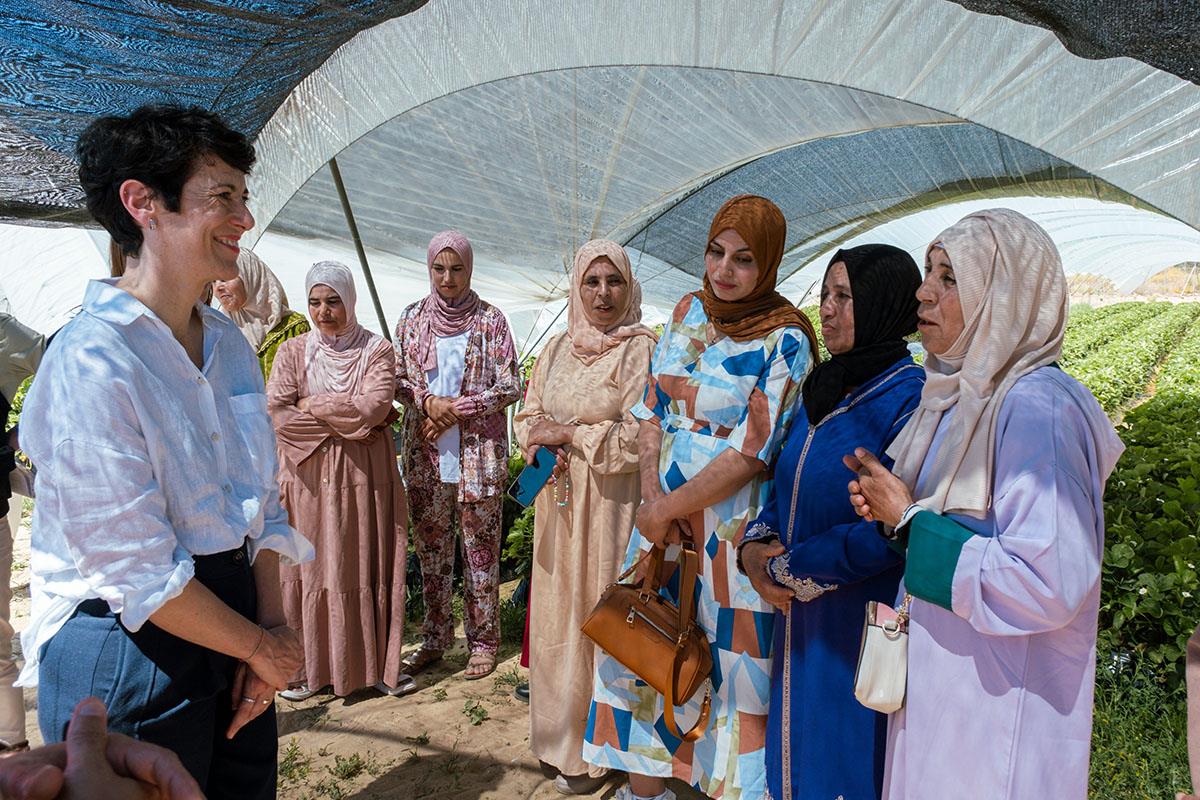Wafira Circular Migration Programme
Elma Saiz meets the Moroccan women who work in the red fruit harvest and receive training in entrepreneurship
News - 2024.5.10
 The Minister for Inclusion, Social Security and Migration, Elma Saiz, talks with the Moroccan seasonal workers who participate in the Wafira Circular Migration Programme
The Minister for Inclusion, Social Security and Migration, Elma Saiz, talks with the Moroccan seasonal workers who participate in the Wafira Circular Migration Programme
Minister Saiz spoke with the seasonal workers currently participating in this circular migration project, who told her that they are already taking the first steps to start a business on their return to Morocco, thanks to the training and technical assistance they have received. These are 12 women who want to open a business in Morocco in sectors such as textiles, food, crops or livestock in order to improve their personal situation and that of their families, as well as that of their villages of origin.
As an example, the testimony of two of the participants, one of whom has opened a clothes shop, while the other has opted for a grocery shop, which employs several members of her family and distributes food throughout the region. The seasonal workers explained to Minister Saiz that this is a unique experience that they would repeat and that it will allow them to achieve their dream of owning their own business, something unthinkable if they had not participated in Wafira.
On the other hand, Elma Saiz thanked Cooperativas Agroalimentarias de Andalucía, a company associated with 'Wafira' which is in charge of managing and coordinating the project, as well as the training programme for the seasonal workers, for their participation.
After visiting the facilities at the La Cañada estate in Rociana del Condado, Elma Saiz met with the media, where she highlighted the value of circular migration, "an example for many countries", and especially the 'Wafira' project. "With this project, Spain is committed to a formula that improves the conditions of seasonal workers, allowing them to combine salaried work in Spain with training that will enable them to become self-employed in Morocco and thus be able to pay contributions and obtain social benefits throughout the migration cycle".
The minister also announced the extension of the programme until February 2025, given the success of the pilot, which was originally scheduled to end in October 2024.
173 women entrepreneurs
Since its launch, 'Wafira' -which in Arabic means abundance- has provided knowledge and technical support to 173 women who have started their own business in Morocco, after completing the entrepreneurship training included in the programme, in addition to the work in the harvesting of red fruits in Huelva.
Once the programme is over, the participating workers return to their country, where they receive assistance from both the International Labour Organisation (ILO) and Moroccan institutions to start up businesses in sectors such as commerce, catering, agriculture and livestock farming, among others.
The initiative is the responsibility of the Ministry of Inclusion, coordinated through the State Secretariat for Migration, which with this project emphasises employability and gives visibility to women, so that women workers benefit fully from their social rights.
For their part, both in Spain and Morocco, tools have been developed for the technical and financial monitoring of seasonal projects. The most emblematic is a coaching and training pathway adapted to the needs of these women. The Moroccan authorities plan to integrate these practices into their national policy.
European funding
The 'Wafira' project, which started in October 2021 and will run until February 2025 - following the four-month extension - has a total cost of €3.25 million, co-financed by the European Union through the Migration Partnership Facility (MPF). The design, implementation and regular monitoring of the project are the responsibility of the governments of Spain and Morocco, which thus strengthen relations between the two countries on the basis of collaboration in the field of regular migration.
The project involves the Spanish Ministry of Inclusion, Social Security and Migration in collaboration with Cooperativas Agro-alimentarias de Andalucía, for the activities in our country. In Morocco, the International Labour Organisation (ILO), the Ministry of Economic Inclusion, Small Enterprises, Employment and Skills (MIEPEEC) and the National Agency for the Promotion of Employment and Skills (ANAPEC) of the Kingdom of Morocco collaborate on activities in Morocco.
Non official translation




